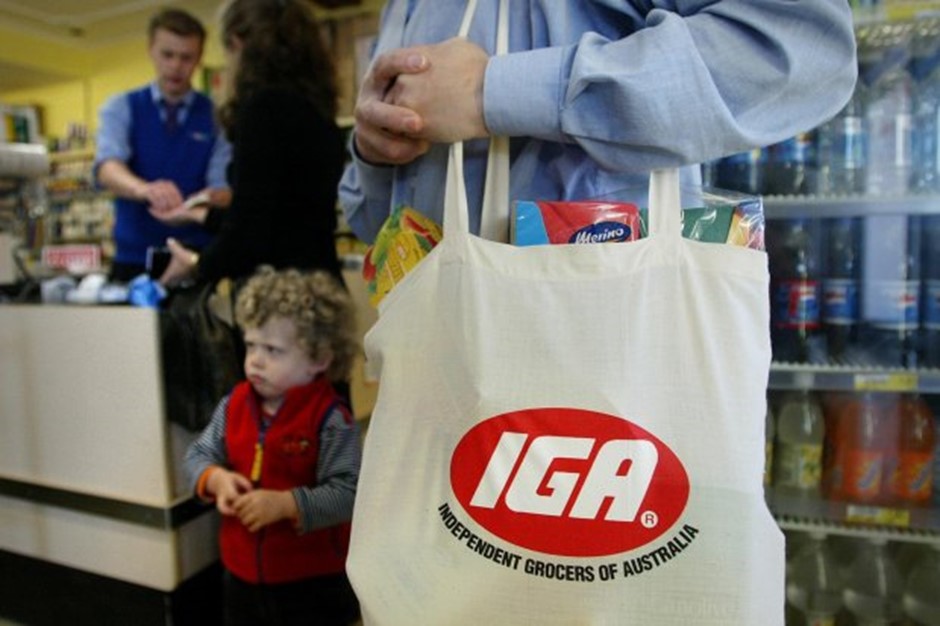AFR, Mar 16, 2021
Wholesaler Metcash will spend $375 million over the next three years refurbishing stores, expanding e-commerce and improving its prices and range to retain the new customers it won from Coles and Woolworths during the pandemic.
About $65 million of the new capex, which was unveiled on Tuesday as part of a reset of Metcash’s five-year MFuture growth strategy, will be spent expanding the wholesaler’s fledgling online food and liquor businesses, future-proofing its independent retailer network amid an accelerating shift to e-commerce.

Metcash IGA retailers have retained the new customers they won during the pandemic. Craig Sillitoe
Metcash’s centralised online food and liquor platforms were put together in the space of two weeks at the height of the coronavirus crisis, and are proving increasingly popular with independent retailers as more consumers shop online.
Group chief executive Jeff Adams said there was a $1 billion sales “opportunity” if the wholesaler could achieve the same market share online that its independent retailers held in food, liquor and hardware.
“The size of the potential prize is large if we just apply our market share in bricks and mortar to that online number – that’s potentially a $1 billion opportunity,” Mr Adams told The Australian Financial Review.
“Our goal is to try to achieve as much of that as we can. This is a big, growing market largely untapped by us and our retailers, outside the good work that’s been done by hardware and Total Tools, and we think there’s an opportunity now for us to really get into it.”

Metcash group CEO Jeff Adams: “The size of the potential prize is large.” Rhett Wyman
The wholesaler was a beneficiary of the pandemic as shoppers flocked to small neighbourhood stores such as IGA, Cellarbrations, Bottle-O, Thirsty Camel and Porters Liquor stores rather than visiting large shopping centres.
A trading update released as part of the strategy update showed that Metcash’s retailers have managed to retain most of these new customers, even though COVID-19 fears have eased.
Supermarket sales rose 14.4 per cent over the past four months – exceeding the growth reported by Coles and Woolworths in the December-half and in January – and total food sales rose 14.1 per cent, excluding the loss of the 7-Eleven contract. This followed total sales growth (ex 7-Eleven) of 16.5 per cent in the October-half.
In the hardware division, sales rose 31.6 per cent, or 19.2 per cent excluding the recent acquisition of Total Tools, fuelled by strong DIY and trade activity and demand for paint, gardening/outdoor products and power tools. This followed sales growth of 20.6 per cent in the October-half.
In liquor, sales rose 19.6 per cent, after growing 14.3 per cent in the October-half, with continued strong sales in retail stores more than offsetting COVID-19 restrictions on “on-premise” customers.
“Clearly there’s a shift in consumer behaviour – we are seeing many new and returning customers continue to shop with us,” Mr Adams said.
Metcash’s food division chief executive, Scott Marshall, said: “We believe it’s sustainable, we don’t think it will go back to normal, there is now a new normal.”
Big spender
Mr Adams said the wholesaler planned to invest $375 million over the next three years upgrading more stores, introducing new store formats, improving range and pricing, expanding its private-label range in food and liquor, accelerating e-commerce and loyalty programs, and upgrading ageing warehouse and transport management systems.
Metcash and its independent IGA retailers plan to refurbish 100 to 130 stores each year, with 1200 stores expected to be refurbished by 2026. The wholesaler will also launch new formats including Supa Valu for the largest stores, which will replace the Supa IGA brand, and Local Grocer, The Fresh Pantry and Village Grocer for smaller stores, which will replace the IGA Express brand.
A new IGA online platform will be launched by the end of the year and 800 stores are expected to be trading online by 2025, up from about 650 now and 180 before the pandemic. They will offer click and collect and home delivery via DoorDash, with other options being explored.
Hammering hardware
In hardware, chief executive Annette Welsh said the group would expand the Sapphire Store program, investing $20 million to refurbish 300 stores by 2025 (up from a 200-store target previously) compared with 130 by the end of April, build a new distribution centre in Victoria and look at opening new greenfield stores.
The hardware division will also accelerate investment in digital, online and loyalty programs, use data to refine its range, and trial new categories including kitchens and bathrooms, gardening and internet-connected home products.
Metcash will scrap two of its four hardware brands, Thrifty-Link and True Value, which account for about 15 per cent of sales, and shift smaller hardware retailers to the Home Timber & Hardware brand by 2024.
It also plans to open more franchised Total Tools stores, expanding the network of professional tool retailers to about 130 by 2025, up from 88.
After cutting costs by about $175 million over the past three years under the MFuture and Working Smarter programs, Metcash plans to cut costs further under Project Horizon, a three-year $70 million to $80 million capex program aimed at offsetting inflation of $20 million to $25 million a year, partly by simplifying processes and replacing nine operating systems with a single system, Microsoft Dynamics 365.
Subscribe to our free mailing list and always be the first to receive the latest news and updates.
